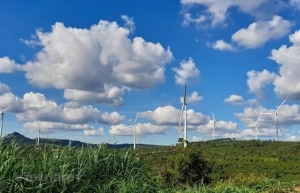Tackling climate change crisis through innovation and tech
The last day of my visit to the country on June 11 marked that we had 2,030 days left until 2030. More than 45 per cent of the global population – around 4.5 billion people – are at high risk of experiencing an extreme weather event. Some 2.3 billion of them are considered poor by official definitions.
 |
| Bård Vegar Solhjell, director general Norwegian Agency for Development Cooperation |
Despite achievements such as the 2015 Paris Agreement, the challenges remain tremendous. To limit warming to 1.5 degrees, we need to cut up to 42 per cent of global CO2 emissions by 2030 to reach net-zero by 2050. How will we get there in just over 2,000 days?
While there are immediate answers, such as continued efforts to scale up investments in solar and other renewable energy, we need to start looking into how to reduce emissions in the hard-to-abate sectors such as cement, shipping and aviation.
Technological innovation is at the heart of reducing emissions from heavy industries, which today make up around 16 per cent of global CO2 emissions. A recent study by researchers at the University of Leeds, University of Bath, and Imperial College London suggested that it may be possible to decarbonise emissions from heavy industries up to 85 per cent.
From advancing nature-based solutions to smart city innovations, technology is paving the way for us to redefine our interactions with a warming planet.
Vietnam stands at the crossroads of climate risk and green transition. Climate change impacts the health of Vietnamese crops, relocates communities and pollutes its coasts. As the estuary of the great Mekong River, plastic pollution has become a major issue for the country, contributing to 80 per cent of its marine waste. Plastic pollution harms land, freshwater, and marine ecosystems, leading to biodiversity loss and adverse health effects.
During my visit to Vietnam, I was happy to see the willingness of the Vietnamese government to address the challenge of plastic pollution.
Vietnam aims to reduce ocean plastic pollution by 75 per cent by 2030. Sustainable waste management at the municipal level - with sorting at source, collection, transport and recycle and reuse - will be key to reaching this goal.
The remaining non-recyclable plastic that goes to landfills today can become a critical resource. Co-processing, where coal is replaced by this plastic in the cement industry, has great potential in addressing plastic pollution in Vietnam.
This approach is being tested in Vietnam today. So far, around 200 tonnes of plastic waste collected from Minh Khai village have been processed and transported to a cement company. The company saves money, the plastic will not be landfilled, and national regulation for environmental standards will be upheld. There is potential for scaling up this process to the national level, paving the way for Vietnam to become a leader among countries in Southeast Asia on green growth.
While Vietnam can set the standard for innovation in heavy industries, it is also taking steps to renew its energy mix. In January, the Norfund-managed Climate Investment Fund invested $10 million in Southeast Asia Clean Energy Fund II. The investment will contribute to scaling-up capital to early-stage companies focused on advancing the low-carbon transition in Vietnam and two other ASEAN countries.
Many of Vietnam’s challenges are shared by other countries. To make the most out of our resources, we need to find solutions that benefit the many – what we usually call global public goods. Many of these are enabled by technology.
Access to high-quality data is crucial in addressing climate and nature challenges because it promotes transparency, collaboration, and informed decision-making. By making environmental data accessible to researchers, policymakers, and the public, we enable a collective approach to understanding and mitigating the impacts of climate change and biodiversity loss.
Vietnam has a forest cover of 42 per cent. Norway has long supported global efforts to reduce deforestation as a highly impactful climate mitigation strategy, to which digitisation is a key component.
Improved satellite monitoring has become a game changer. High-resolution satellite data provides comprehensive surveillance capabilities, allowing governments, civil society, researchers, and journalists to monitor vast and remote areas of the rainforest that are otherwise inaccessible.
Satellite images and data, in concert with AI for large-scale analytics, provide crucial knowledge on deforestation, changes in land use, and environmental degradation, providing a bird’s-eye view of illegal activities and natural loss.
Through Norway’s International Climate and Forest Initiative satellite data programme, more than 30,000 users from nearly 160 nations make use of free, high-resolution imagery of the tropics.
The green transition is an imperative for the survival and wellbeing of our planet and future generations. Technology, with its vast and varied applications, is playing a pivotal role in facilitating this transition. By embracing renewable energy, leveraging circular approaches to decarbonisation and making best use of open-source solutions offered by digital technologies, we can build a sustainable and resilient future.
Greening the future in an inclusive and collaborative way is key. The successful integration of technology into the green transition requires collaboration between governments, businesses, and communities. Communities and individuals must adopt and advocate for sustainable technologies and lifestyles.
As we stand at this critical juncture in human history, the synergy between technology and sustainability offers a beacon of hope. By harnessing the power of technology, we can turn the tide on climate change and pave the way for a greener, healthier, and more prosperous world. In this transition, every day until 2030 will count.
 | Renewable energy – leading solution to climate change mitigation in ASEAN Investing in renewable energy sources is as a palliative measure for ASEAN to mitigate climate change, according to Vice President of Infrastructure Solutions at Malaysian-based Vertiv Chee Hoe Ling. |
 | Vietnam, UK expand climate change cooperation Vietnam and the United Kingdom are expanding cooperation in response to climate change, with a new multi-year climate programme in the pipeline. Iain Frew, British Ambassador to Vietnam, spoke to VIR’s Bich Thuy about how this expanded climate collaboration supports Vietnam on its net-zero path. |
What the stars mean:
★ Poor ★ ★ Promising ★★★ Good ★★★★ Very good ★★★★★ Exceptional
Related Contents
Latest News
More News
- Trung Nam-Sideros River consortium wins bid for LNG venture (January 30, 2026 | 11:16)
- Vietnam moves towards market-based fuel management with E10 rollout (January 30, 2026 | 11:10)
- Envision Energy, REE Group partner on 128MW wind projects (January 30, 2026 | 10:58)
- Vingroup consults on carbon credits for electric vehicle charging network (January 28, 2026 | 11:04)
- Bac Ai Pumped Storage Hydropower Plant to enter peak construction phase (January 27, 2026 | 08:00)
- ASEAN could scale up sustainable aviation fuel by 2050 (January 24, 2026 | 10:19)
- 64,000 hectares of sea allocated for offshore wind surveys (January 22, 2026 | 20:23)
- EVN secures financing for Quang Trach II LNG power plant (January 17, 2026 | 15:55)
- PC1 teams up with DENZAI on regional wind projects (January 16, 2026 | 21:18)
- Innovation and ESG practices drive green transition in the digital era (January 16, 2026 | 16:51)

 Tag:
Tag:




















 Mobile Version
Mobile Version